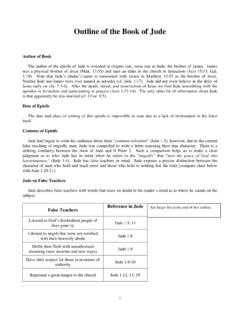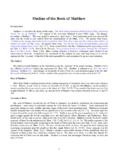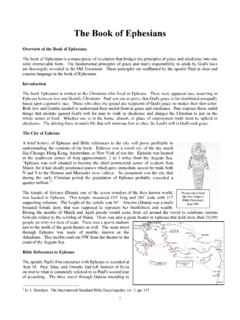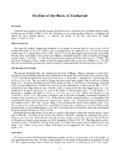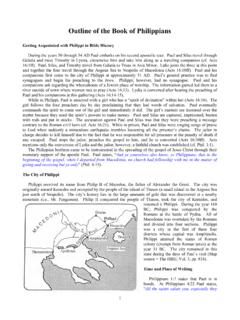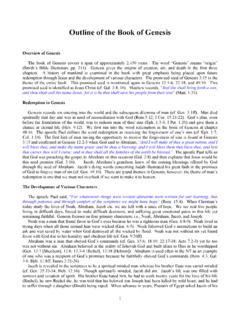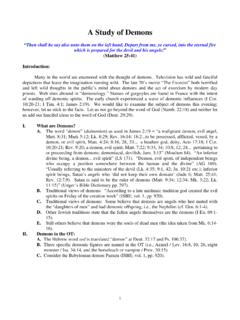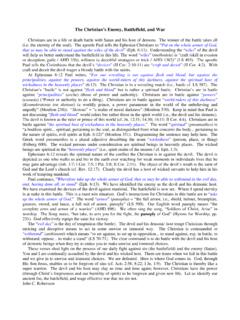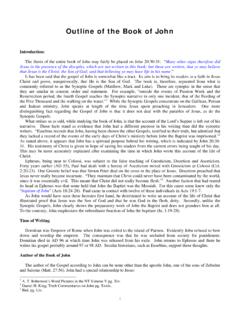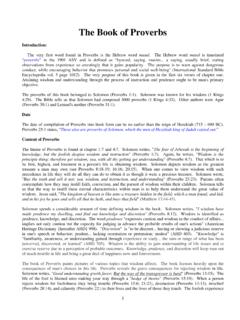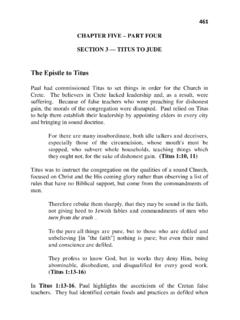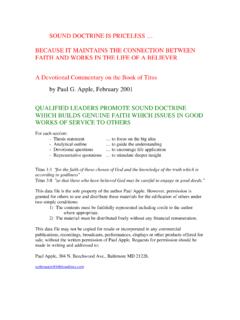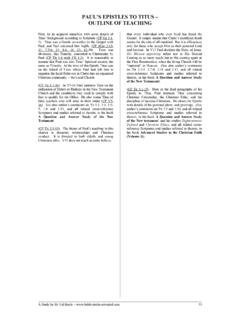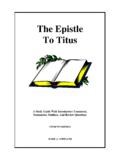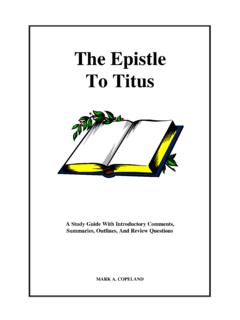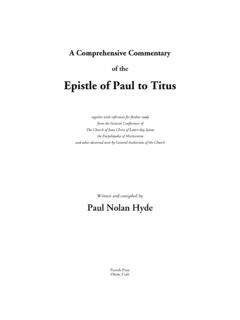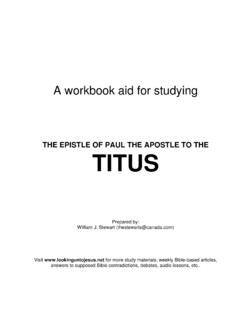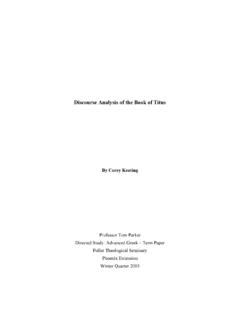Transcription of Outline of the book of Titus - Floral Heights Church of Christ
1 1 Outline of the book of Titus in hope of eternal life, which God, who cannot lie, promised before times eternal Titus 1:2-3 Titus We do not find any particulars about the life of Titus in the book of Acts. What we know of Titus is recorded by the hand of Paul in his epistles. Paul records five facts about Titus . Titus was a Greek of unrecorded homeland (Gal. 2:3). Paul apparently baptized Titus and he became a traveling companion ( Titus 1:4). Titus had accompanied Paul and Barnabas to Jerusalem from Antioch to ascertain the elders and apostles about the question of circumcision (Acts 15:2 compared to Galatians 2:1ff). Later, Paul would use Titus to deliver I Corinthians, admonish them to give to the needy saints in Jerusalem, and report back regarding the welfare of the erring brethren in Corinth (cf. II Cor.)
2 7:13-16; 8:5-24). The last we know of Titus was that Paul left him in charge of setting in order the things that were wanting, and appoint elders in every city on the island of Crete ( Titus 1:5). Date of epistle Dating the book of Titus takes into consideration a fifth tour by the apostle Paul. At the end of Paul s fourth tour to Rome he was left a prisoner for two years (AD 62 63) (Acts 28:30). After writing the book of Hebrews from his Roman imprisonment, the apostle Paul, Timothy, and Titus travel to Judea to visit the Hebrew Christians (Heb. 13:23-24) (not recorded but rather speculated / jcr). These brethren were suffering persecution for the cause of Christ and it was Paul s intention to comfort them (Heb. 10:32-36). While traveling through the Mediterranean Sea (on their way to Judea), they stop at the island of Crete.
3 A Church may have already been established through the work of Paul when traveling as a prisoner to Rome Italy (cf. Acts 27:9ff). Paul leaves Titus on the island to help the new converts in their spiritual growth and to establish an eldership ( Titus 1:5). Leaving Crete, Paul and Timothy come to Judea, comfort the Christians and travel back into Asia where they visit the churches in Ephesus and Colossi. Upon arrival in Ephesus, Paul finds false teachers spreading false doctrine. Paul leaves Timothy in Ephesus to fight the false teaching (I Tim. 1:3) and travels through the Aegean Sea to revisit the churches in Macedonia as he had promised while in his first imprisonment in Rome (Phil. 2:24). Leaving the area of Macedonia, Paul travels to Nicopolis where he had planned to spend the winter ( Titus 3:12). The city at which Paul instructed Titus to meet him (Tit.)
4 3:12) was most likely Nicopolis in Epirus, sometimes rather generally referred to as Nicopolis in Achaia. 1 Paul writes the first epistle to Timothy from Nicopolis (65 AD) (I Tim. 1:3). Paul sends Artemas or Tychicus to relieve Titus in Crete and likely sends the epistle under consideration to him then ( , 65 AD) ( Titus 3:12). Having heard of the troubles in Crete, Paul traveled back to the island with Titus , Erastus and Trophimus (II Tim. 4:20) before going to Rome. Content / Occasion of writing / Theme of Titus The theme of Titus appears to be found at chapter 1:2-3, in hope of eternal life, which God, who cannot lie, promised before times eternal. Eternal life is supplied by God s grace. Paul writes, For the grace of God hath appeared, bringing salvation to all men ( Titus 2:11). God s grace appeared in the form of Jesus Christ who redeemed us from the bondage of our sin through his blood sacrifice on the cross ( Titus 2:13-14).
5 Jesus taught the gospel of the kingdom while among the living (Matt. 4:23 etc.). Jesus promised his disciples that the Holy Spirit (the comforter) would come to convict the world in respect of sin, and of righteousness, and of judgment: (Jn. 16:8). Said words of instruction would come to be known as the faith, truth, or the gospel message (compare Titus 1:1 and Eph. 1:13). There were things wanting on the island of Crete. The Church had men teaching things which they ought not ( Titus 1:11) such as Jewish fables and commandments of men ( Titus 1:14). There were heretics who had departed from the established standard of truth ( Titus 3:10). The Christians on the island of Crete were being infected not only with society s spiritual disease of lying, lack of self control, and laziness ( Titus 1:12) but 1 Borchert, G.
6 L. The International Standard Bible Encyclopedia; Vol. 3, pg. 534 2from within by erring brethren. To keep the Christians pure and undefiled from such evil influences and false teachers that surrounded them the apostle leaves Titus at Crete to establish an eldership in each of the churches ( Titus 1:5). Secondly, Titus was to instruct the aged men, aged women, young men, young women and slaves to live according to sound doctrine ( Titus 2:1-10). The salvation of men s souls was dependant upon the success of the work of Titus at Crete. Thereby Paul connects God s grace ( Titus 2:11) to man s redemption (2:14), purification (2:14), obedience (3:1), baptism (3:5), justification (3:7), and eternal life (3:8). These facts equate to the distinctive gospel message (cf. Titus 2:1). Christians today are to learn the gospel message of salvation and thereby maintain good works unto salvation ( Titus 3:14).
7 Chapter 1 I. Paul delivers this epistle to Titus in keeping with God s will to save man from their Sins (1:1-4): A. Paul, a servant of God, and an apostle of Jesus Christ , according to the faith of God s elect, and the knowledge of the truth which is according to godliness, in hope of eternal life, which God, who cannot lie, promised before times eternal (1:1-2). 1. The Apostle Paul s letter to Titus begins by associations that reveal God s eternal promise to save man from the consequences of sin. 2. Paul s apostleship is in keeping (accordance) with: a. The faith of God s elect. The elect (eklektos) = picked out, select (LS 240). Who are God s select and picked out people? The apostle Peter states, But ye are an elect race, a royal priesthood, a holy nation, a people for God s own possession, that ye may show forth the excellencies of him who called you out of darkness into his marvelous light: (I Pet.)
8 2:9). The elect of God are thereby those who have been called out of darkness to light. Note that Paul tells the Thessalonians that it is the gospel that does such calling to any and all who would obey (cf. II Thess. 2:13-14). Said class of people were foreordained before the foundation of the world (cf. Rom. 8:28ff; Eph. 1:3ff). Paul is an apostle of Jesus Christ in keeping with the hope of the elect of God; , the forgiveness of sins. Here are people who hear the gospel, believe it, and obey it. They receive the forgiveness of their sins based upon their obedient acts (as this book and Romans 6:16-25 illustrates). b. The knowledge of the truth which is according to godliness. Paul is also an apostle of Jesus Christ in keeping with the truth. The truth is the gospel message (Eph. 1:13). The truth reveals Jesus, his teachings on the forgiveness of sins.
9 Paul is thereby a messenger ( , an apostle) of this message. c. In hope of eternal life. The hope of receiving the forgiveness of sins and eternal life with God is the message of the gospel that Paul is an apostle of. 3. Those who meet God s prescribed standards as the elect through knowledge of truth certainly have hope in God s promise to forgive them of their sins. God s promise was in keeping with His eternal objective for man (again see Eph. 1:3ff). God s promise has ever been to forgive man of their sins (cf. Acts 2:38ff; 13:23ff; Gal. 3:14). B. but in his own seasons manifested his word in the message, wherewith I was intrusted according to the commandment of God our Savior; to Titus , my true child after a common faith: Grace and peace from God the Father and Christ Jesus our Savior (1:3-4). 1. Jehovah, in the fullness of time, sent forth His Son to die for the redemption of mankind (Gal.)
10 4:4). After Jesus was resurrected he charged his disciples (the apostles) to Go and make disciples of all the nations, baptizing them into the name of the Father and of the Son and of the Holy Spirit: teaching them to observe all things whatsoever I commanded (Matt. 28:19). The season for the manifestation of truth had come and Paul, with others, had been entrusted by God s commandment to go and teach. 2. Paul, in keeping with God s command to teach the gospel truths, now writes Titus . The message we are about to study thereby is of divine revelation and has much to do with the promises of God to forgive us of our sins! 33. Titus was Paul s true child after a common faith. This likely means that Paul taught him the truth and baptized him. II. Paul Review s Titus objective while at Crete (1:5-9): A.
